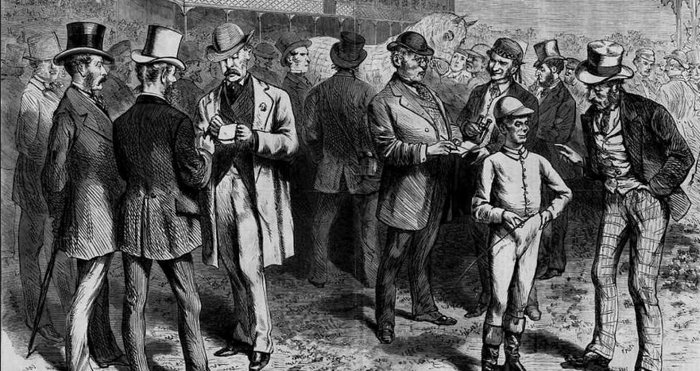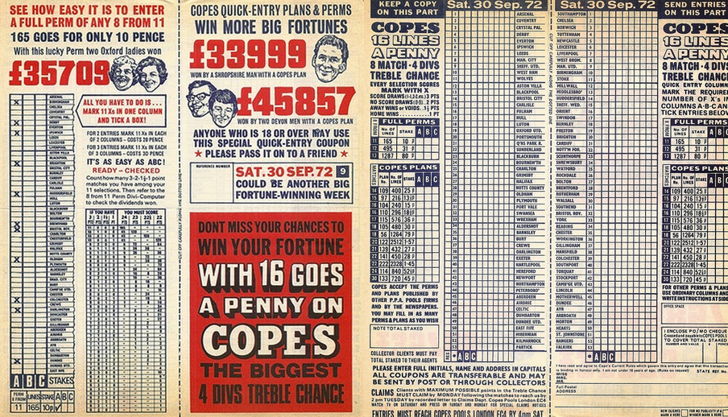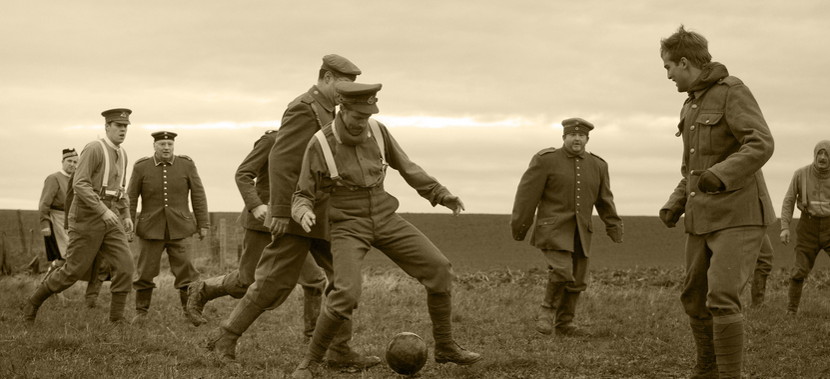 Nowadays we as good as take it for granted that we can place a bet or two on football matches. The industry has developed to such an extent now that you can place countless wagers whilst a match is still underway, thanks in no small part to the invention of In-Play betting.
Nowadays we as good as take it for granted that we can place a bet or two on football matches. The industry has developed to such an extent now that you can place countless wagers whilst a match is still underway, thanks in no small part to the invention of In-Play betting.
If you think that your bet is taking a turn for the worse then you can choose the Cash Out option and still make a profit or, at the very least, mitigate your losses. Whether you bet online or in the shops, the industry is changing at an incredible pace and it is only going to get more and more exciting over the coming weeks, months and years.
All of which begs the question, what did things used to be like? Have people always been able to bet on football matches, or is that a reasonably new development? How have things changed over the years to get us to the point that we’re at now?
These are some of the questions that we’ll be hoping to answer on this page. We’ll talk you through football’s relationship with betting and how the modern game has embraced it more than any previous generation was able to. The big question is, will things keep heading in the same direction or are they likely to change?
Football Before Gambling

Let’s start back at the beginning, before betting on football was quite the common place thing that it is today. Though there’s little documented evidence for the idea of people placing wagers on football matches when the sport was in its embryonic stage, it’s extraordinarily unlikely that folks simply turned up at games, watched them pan out and then headed home. After all, the act of gambling dates back to before the written word, most likely to the Paleolithic era. In Mesopotamia in 3000 BC there were six-sided dice, suggestive of the outcome of fortune being something that citizens of the time would have placed a wager on.
Back, then, though, it would have simply been a friendly bet placed with a mate; perhaps over which team would win the game or who would score the first goal. If you wanted to place a more ‘formal’ bet then you would have to do so with illegal back-street bookmakers, given that fixed-odds sports betting wasn’t a legal activity at the time. In fact, the parimutuel system of betting wasn’t invented until 1867 when a Catalan named Joseph Oller came up with it. Initially that type of betting was largely reserved for horse racing, with a fixed-odds system not introduced until the 1880s.
Interestingly, football was intrinsically tied up with the invention of a fixed-odds betting style. As the game began to develop in popularity towards the end of the nineteenth century, newspapers realised that people enjoyed it enough to want to buy papers if there was something worth their while in them. As a result, they began to offer prizes to readers who were able to correctly predict the outcome of matches. Because those prizes were fixed, the whole process became known as ‘fixed-odds’. That manner of placing a wager didn’t grow in popularity until the 1960s, however, with the parimutuel bet becoming the first legal one that you could place on football matches thanks to the invention of the football pools.
The Football Pools

The first football pools were offered outside Old Trafford in 1923. There’s a more in-depth article about that elsewhere on the site, but it’s impossible to talk about the development of betting and football without at least giving it a passing mention here. With the invention and development of online betting it’s almost impossible to imagine just how popular the football pools were at their height. Even today, of course, the classified results still tell us information about the pools results, but back before fixed-odds betting became so popular the pools was pretty much the only choice you had if you wanted to place some sort of wager on a football match – and plenty of people wanted to do just that.
The first company to offer the football pools was Littlewoods, founded but a man named John Moores who was a philanthropist and also a Manchester United fan. He came into contact with John Jervis Barnard at a time when he was looking for a money-making scheme and Barnard happened to have one – the football pools. Moores came together with two friends, Colin Askham and Bill Hughes, and the each invested £50 in getting their own version of Barnard’s game up and running. By the middle of the 1924-1925 season it seemed as though the whole scheme was going to collapse, with each of the three men having already invested £200 apiece. Askham and Hughes were ready to cut their losses so Moores bought them out of the business.
It was John Moores’s wife who we have to thank for the fact that the football pools did eventually take off. She told her husband ‘I would rather be married to a man who is haunted by failure rather than one haunted by regret’, so he kept on plugging away and eventually the business caught on. It took off to such an extent that rival companies began springing up all around the country, the best known of which was Vernons. By the start of the 1930s Moores was a millionaire, all thanks to his persistence with the Littlewoods Pools. He then started up the Littlewoods Mail Order Service, which was itself a roaring success. That, though, is a story for another time and on another website.
Football In The Post-War Years

Attendance at football matches were at an all-time high following the Second World War. Working class people in the UK not only had more disposable income but also a desire to live their lives whilst they could, knowing that it was precious and might be over at any moment.
That was why the football pools took off and it was also why punters found loopholes to place bets in other ways.
The Ready Money Football Betting Act, which came into effect in 1920, was intended to limit the amount of gambling that could be done on sports but in actual fact ended up making things clearer for those that wanted to have a flutter. It didn’t outlaw credit betting, meaning that books could accept wagers made by Postal Order, just not cash.
This is in fact how some of Britain’s bookies such as William Hill started out, offering bets to high profile clients using credit.
Changes To Gambling Law In The UK
 As mentioned already, betting will have been taking place long before the 1923 football pools came into place. In 1853, for example, the Betting Houses Act was introduced and made it an offence to ‘resort to any place or person for the purposes of betting and bookmaking’. Evidence from the Manchester Police in the 1840s and 1850s showed that it was mostly the working class that was being arrested for venturing to betting houses. It’s fair to say that the involvement of betting in football wasn’t seen as a universally good thing. Sir J. Charles Clegg, who was the Chairman of the Football Association in the 1920s, said, “If betting gets hold of football, the game is done for”.
As mentioned already, betting will have been taking place long before the 1923 football pools came into place. In 1853, for example, the Betting Houses Act was introduced and made it an offence to ‘resort to any place or person for the purposes of betting and bookmaking’. Evidence from the Manchester Police in the 1840s and 1850s showed that it was mostly the working class that was being arrested for venturing to betting houses. It’s fair to say that the involvement of betting in football wasn’t seen as a universally good thing. Sir J. Charles Clegg, who was the Chairman of the Football Association in the 1920s, said, “If betting gets hold of football, the game is done for”.
Eventually those in positions of power could fight the good fight no more, so the law needed to change. The Betting and Gaming Act of 1960 was the first moment that additional forms of gambling were legalised across the United Kingdom. It was the result of the Royal Commission on Betting, Lotteries and Gaming, which ran from 1949 until 1951. It allowed the opening of betting shops on public street from the first of May 1960 and within months tens of thousands of such shops sprang up around the country. They weren’t particularly fun or pleasant places to attend, with the venues filled with smoke and the smell of liquor as men, it was virtually all men, cheered on their horses or placed other bets on various sports.
You can read more about UK gambling licencing and law in our dedicated article.
Legal Betting Shops Radically Change Football Betting
 Five years before the introduction of the Act, Mark and Cyril Stein had bought Ladbrokes. That event in and of itself was innocuous, but after the legalisation of off-course betting shops the Steins used the profits that they’d built up since acquiring the company to open a host of high street shops.
Five years before the introduction of the Act, Mark and Cyril Stein had bought Ladbrokes. That event in and of itself was innocuous, but after the legalisation of off-course betting shops the Steins used the profits that they’d built up since acquiring the company to open a host of high street shops.
Far more importantly, the Steins were the first bookmakers to introduced fixed-odds betting on football matches, changing the way that people placed bets forever.
Pools betting was fun, but being able to place different bets on various aspects of the game was what most punters wanted. The trouble back then was that the law still prohibited bettors from placing single bets on football matches that weren’t being shown live on television. If you wanted to have a flutter on teams that weren’t on the box then your bet had to be placed alongside two other selections in something known as the ‘Minimum Treble Rule’.
Believe it or not, it wasn’t really until the 1990s that these rules began to be loosened up, with one thing in particular helping the explosion of both football as a multi-million pound sport and betting on it as an activity.
The Arrival of Sky Sports
 Nothing has changed how we view and bet on football as much as the introduction of Sky Sports to mainstream television coverage. It was launched in 1992, alongside the start of the Premier League. Football matches went from being shown once a week at most to several matches getting broadcast over the course of a weekend.
Nothing has changed how we view and bet on football as much as the introduction of Sky Sports to mainstream television coverage. It was launched in 1992, alongside the start of the Premier League. Football matches went from being shown once a week at most to several matches getting broadcast over the course of a weekend.
To begin with, bookmakers didn’t quite understand the possibilities involved with this explosion in televised football, but it didn’t take them long to cotton on to the importance of it in the development of their industry.
Perhaps the largest change occurred when Denise Coates launched Bet365 and along with Betfair pioneered the In-Play betting format. Suddenly punters could not only watch an increase in matches but they could also bet on them in countless different ways.
The simple ante-post bets were no longer all people could place, instead having the ability to have a punt on the time the next goal would be scored or how many corners there would be in the game. This gave bettors a significantly larger number of options, but it wasn’t until the proliferation of the internet that things went one step further.
How Betting Has Influenced Football
 It wasn’t just football that influenced betting, of course. Soon betting began to influence football, especially when bookmakers realised the vast audience of the Premier League and how they could take advantage of that to advertise their wares around the world. Though betting companies might well be everywhere in the modern game, it actually took until the 2002-2003 season before a bookie got around to sponsoring a top-flight team. The side was Fulham and the company was the then newly launched Betfair.
It wasn’t just football that influenced betting, of course. Soon betting began to influence football, especially when bookmakers realised the vast audience of the Premier League and how they could take advantage of that to advertise their wares around the world. Though betting companies might well be everywhere in the modern game, it actually took until the 2002-2003 season before a bookie got around to sponsoring a top-flight team. The side was Fulham and the company was the then newly launched Betfair.
It’s interesting that the first betting firm to getting involved with shirt sponsorship was one that approached the industry from an entirely new angle, with Betfair only offering Exchange betting at the time and not launching a sportsbook until 2011.
By the time the 2017-2018 season got underway, 50% of teams in the top-flight were sponsored by betting companies. Why is it that football and betting make such good bedfellows? The simple answer is global appeal.
Bookies can take bets from punters around the world as long as the laws of a specific country don’t forbid them from doing so, whilst more than one hundred countries around the globe will broadcast live Premier League football matches. It’s obviously not overly complicated why bookies would want to get their names emblazoned across the front of the biggest top-flight clubs, whilst those clubs themselves are happy to have deals with the most popular bookmakers as they’ll receive a huge amount of money in return.
Impact Of Technology On Football Betting
 The other major factor in the way we bet has been the development of various technologies. In-Play betting wouldn’t be possible without the improvements to computers that we’ve seen over the last could of decades, whilst high-speed internet access being found in virtually every home in the UK means that people no longer need to head to a betting office in order to place a wager. Gone are the days of bookmaker shops being dark and dingy venues that were deliberately designed to make people wary of entering them. Now all of the biggest companies have shiny apps for mobile phones, meaning that punters can have a flutter whilst they’re sat in the pub with their mates enjoying a pint.
The other major factor in the way we bet has been the development of various technologies. In-Play betting wouldn’t be possible without the improvements to computers that we’ve seen over the last could of decades, whilst high-speed internet access being found in virtually every home in the UK means that people no longer need to head to a betting office in order to place a wager. Gone are the days of bookmaker shops being dark and dingy venues that were deliberately designed to make people wary of entering them. Now all of the biggest companies have shiny apps for mobile phones, meaning that punters can have a flutter whilst they’re sat in the pub with their mates enjoying a pint.
That exposition of mobile phones and the apps that accompany them has also been a game changer. It’s allowed bookies to explore methods of attracting customers that differ from In-Play betting alone. Options such as the ability to Cash Out a bet are drawing in bettors like never before, attracted by the possibility of saving a bet just as it looks as though it’s on the verge of being a loser. The more that technology continues to develop the more likely it is that betting companies will find a way of taking advantage of that, with virtual reality surely likely to be the next port of call for a bookmaker that can figure out a way to make use of it.
The biggest betting sites themselves also now live stream an enormous amount of football. Fine, this isn’t the Premier League but it is still high quality matches from home and abroad. This has has resulted in punters betting far further afield than they would have done years ago, it is common now for UK punters to bet on an Argentinian or Chinese league match online in a way you simply wouldn’t have done previously. This is driven largely by the ability to watch these games for free through bookies.
The Future Of Football And Gambling
 You can already bet on virtual sports, with football being one of those offered by certain companies. Imagine the possibilities that will come with the aforementioned development of virtual reality.
You can already bet on virtual sports, with football being one of those offered by certain companies. Imagine the possibilities that will come with the aforementioned development of virtual reality.
Instead of having to keep up with a match by watching the stats change on your mobile phone, you might be able to watch it develop in front of you courtesy of computerised players carrying out actions on a headset. You could be stood inside a reimagined betting shop, placing wagers with fake people but doing so in the real-time manner that has made In-Play betting such a hit.
It’s certainly unlikely that betting will go the same way as tobacco and alcohol and be banned from involvement with the sport. It’s too beneficial for both clubs and companies for that to be allowed to happen.
Yes, alcohol and cigarettes shouldn’t be sold to minors but there were always ways around that that meant the world of football was never entirely comfortable with the match ups with those two industries. You need to have proven your age in order to place a bet, however, even if you’re using a website online. It means that global conglomerates, which is what the biggest football clubs are nowadays, can be more comfortable with their relationship with an industry that’s doing its best to clean up its image.
Past Problems With Gambling And Football

It might be doing its best to clean up its imagine nowadays, but things haven’t always been rosy when it comes to the relationship between football and betting.
Here are some of the most high profile incidents when the two have combined in less than satisfactory circumstances:
- Robert Hoyzer was a German referee who was found guilty of fixing matches in the lower tiers of German football on behalf of a Croatian bar owner and gambling addict. He was paid in the region of €67,000 in 2005 for his part in the scandal, which involved him giving red cards and disputed penalties.
- The 1980 Totonero Scandal in Italy led to countless bans after Italian officials were uncovered fixing a huge range of matches. Two managers and twenty players ended up being banned because of the case.
- Countless players have had gambling addictions in the past, such as Chelsea’s Eider Gudjohnsen who managed to rack up a £6 million debt. Matthew Etherington admitted that he lost £1.5 million during 2010, while Paul Merson has endured a torrid time of it since retiring from the game. Though he’s a well-known pundit now, ‘Merse’ is believed to have lost in the region of £7 million thanks to gambling, drugs and alcohol.
Famous Football Betting Sensations
As much as there have been countless issues when it comes to betting and football, the combination has also led to a whole host of genuinely thrilling moments.
Here are some of the most obvious ones:
Liverpool Win Champions League – 100/1
When Liverpool went 3-0 down to AC Milan at half-time in the Champions League Final in 2005, few people gave the Merseyside club any chance of making a comeback. That was especially true for the bookmakers, most of whom offered odds in the region of 100/1 for the Reds to lift the trophy. They duly did, of course, thanks to a Steven Gerrard inspired second-half that left some bookies wishing for the days before In-Play betting.
Leicester Win Premier League – 5000/1
The biggest shock of all time occurred in 2016 when Leicester City defied the odds to lift the Premier League trophy for the first time in the club’s history. The season before the Foxes had flirted with relegation, only for Claudio Ranieri to lead them to the most improbable title challenge of all time the following year. Bookmakers thought it more likely that Elvis was alive and well at the start of the season than Leicester would be able to win the English top-flight, offering odds of 5000/1 for the East Midlands club to pull it off.
Bayern Munich Win Champions League – 1600000/1
It’s not just one-off bets that can land big, of course. A Manchester United fan once won half a million pound from a 30p bet when an incredible accumulator he placed came home. The chances of it being a winner were 1.6 million to one, but the previous fourteen punts all came home for him before Bayern Munich won the Champions League 5-4 on penalties against Valencia. Remarkably, the same punter had won £157,000 from a £2 bet in 1999 when the club he supported won the treble.